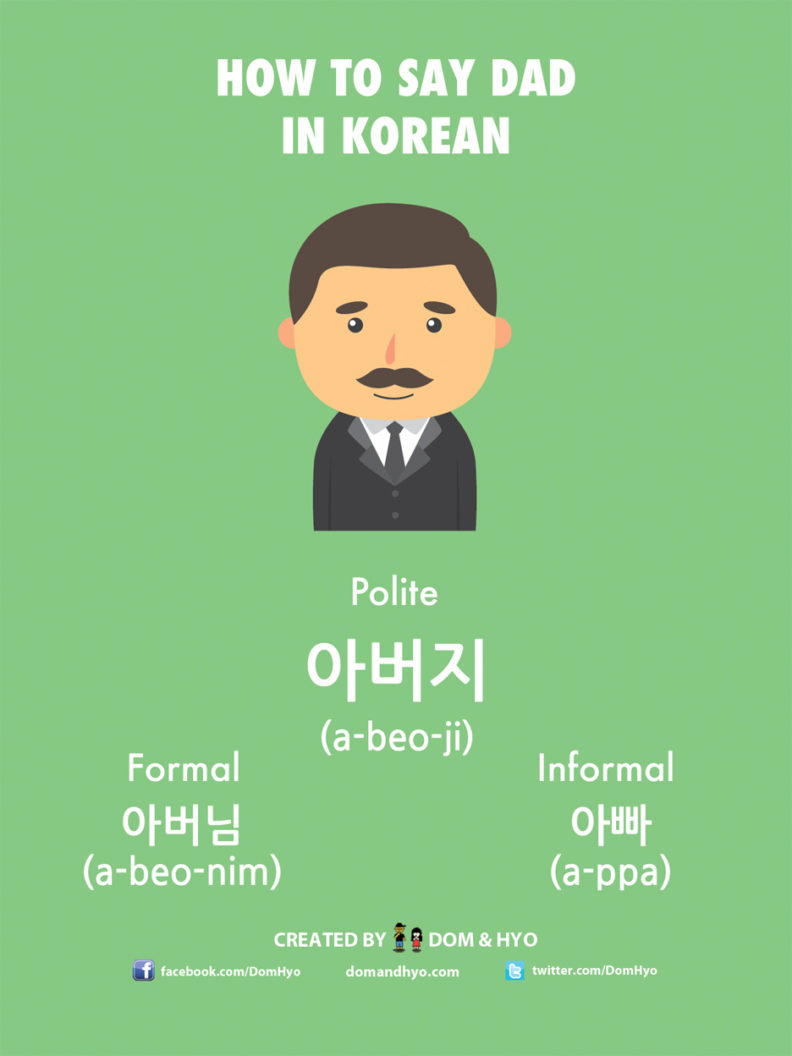Learn Korean: Words For "Father" & How To Use Them!
Ever wondered how to express the vital familial bond of "father" in the rich tapestry of the Korean language? The Korean language offers a fascinating spectrum of terms, each imbued with nuances of formality, affection, and respect, providing a window into the cultural values placed on family relationships.
The journey of mastering a new language is not merely about learning words; its about understanding the cultural context that breathes life into those words. The Korean language, with its intricate system of honorifics and familial terms, is a perfect example of this. The way you address your father, or someone elses father, can speak volumes about your relationship with them, and the social setting in which you find yourself.
Let's delve into the various ways the concept of "father" is expressed in Korean, exploring the subtle gradations of meaning and context that make this aspect of the language so compelling. Whether you're a beginner taking your first steps in Korean, or a seasoned learner aiming to refine your linguistic skills, understanding these distinctions is key to effective and culturally appropriate communication.
| Aspect | Details |
|---|---|
| Core Korean Words for Father |
|
| Additional Terms |
|
| Usage Context |
|
| Cultural Notes |
|
| Resource Link | WordHippo for more Korean word references. |
Beyond the basic translations, it's crucial to understand the context in which these words are used. "Abeoji" is the equivalent of "father" in English, a formal term used in respectful situations. "Appa," on the other hand, is a term of endearment, akin to "dad" or "daddy." Its the word most children use when addressing their fathers, and it can often be used by adults, too, particularly within close-knit families.
When referring to someone else's father, the Korean language uses honorifics. In this case, (Abeonim). This form underscores the respect inherent in Korean culture for elders and those in positions of authority. Its a crucial distinction for learners to grasp, as incorrect usage could lead to unintended disrespect or awkwardness.
Consider the cultural dynamics at play: Korean society places a high value on familial relationships, and language is a primary tool for expressing and reinforcing these bonds. This is why understanding the different forms of "father" is more than just a vocabulary exercise; its a gateway into the heart of Korean social etiquette. The choice of which term to use often depends on a myriad of factors: age, relationship, and social setting all play crucial roles in determining the appropriateness of the word.
- Movies Like It Comes At Night Find Your Next Tense Watch Discover Now
- Tv Trp Rankings Anupamaa Yeh Rishta More
The movie "Ode to My Father" (Korean: ) offers a moving illustration of the significance of family in Korean culture, particularly the father-child relationship. The film, which is based on a true story, tells the story of a man's life, highlighting the sacrifices and commitments made to family through the tumultuous times of the Korean War and beyond. The film underscores the themes of family loyalty, resilience, and the profound impact of a fathers role.
Another interesting aspect in learning these terms is the broader context of Korean family terms. These terms are not just about addressing your father or other peoples fathers; theyre intertwined with how Koreans refer to all family members. Korean familial relationships are divided according to age, gender, and specific connections. Knowing the core terms like "mother" ( - eomeoni/ - eomma), "older brother" ( - hyeong/ - oppa), and "older sister" ( - nuna/ - eonni) can allow you to communicate more fluently about your family and how you are related to others.
For language learners, this can be a great place to begin studying as it will also touch on the subject of honorifics. Learning how to accurately use these terms requires sensitivity and awareness of the social context. It is a key element in understanding Korean cultural values. Remember the suffix "-nim," as it is added to people's names or titles when addressing them respectfully. However, one never adds this to their own name!
In the context of the popular Korean drama "My Father is Strange" (Korean: ), the various terms of endearment for the father are displayed in a family setting. This popular drama shows the emotional nuances of family dynamics, and the different ways children address their fathers. In this instance, Byun Han Soo is the father and his wife, Na Yeong Shil, is a devoted mother to their children, demonstrating a comprehensive depiction of family relations. The narrative shows how the formal and informal terms can be used.
Mastering the Korean words for father involves more than simply memorizing vocabulary. It requires a deep understanding of Korean culture, familial relationships, and the subtle nuances of language. In addition to the terms provided, it's also helpful to consider supplementary vocabulary that relates to family. For instance, learning words like "family" ( - gajok), "parents" ( - bumo-nim), "son" ( - adeul), "daughter" ( - ttal), "husband" ( - nampyeon) and "wife" ( - anae) will help you to build a strong foundation in Korean familial terminology.
If you're ever unsure how to express the word "father" in Korean, there are also some general, widely accepted expressions to use when you arent sure, such as " (gwaenchanayo)", " (gwaenchana)", " (arasseo)" or " (ne)". These words are widely used and accepted in Korea, and can assist you with your conversation.
So, the next time you find yourself conversing in Korean or watching a Korean drama, pay attention to how people address their fathers and other family members. You'll start to recognize the different words, and understand the crucial cultural concepts. It's all part of the enriching experience of learning a new language and deepening your understanding of Korean culture.



Detail Author:
- Name : Citlalli Harvey
- Username : roslyn84
- Email : jay07@hotmail.com
- Birthdate : 1988-01-12
- Address : 39862 Gardner Club New Louisaberg, CO 73499-3458
- Phone : 1-610-541-4690
- Company : Ernser and Sons
- Job : Supervisor of Police
- Bio : Deserunt itaque impedit consectetur quisquam qui. Est sint quisquam ullam voluptatem omnis autem. Molestiae voluptatum molestiae eum sint quas. Consequatur est amet mollitia id assumenda ut et.
Socials
instagram:
- url : https://instagram.com/jschamberger
- username : jschamberger
- bio : Nesciunt enim eius accusantium molestiae. Enim sed error quis quia voluptatem.
- followers : 2745
- following : 2035
tiktok:
- url : https://tiktok.com/@schamberger1974
- username : schamberger1974
- bio : Quas aut consequatur sed quibusdam molestias molestias ut.
- followers : 6685
- following : 285
twitter:
- url : https://twitter.com/julieschamberger
- username : julieschamberger
- bio : Beatae culpa et quia. Ut non aliquid iure molestias aperiam ut recusandae facere.
- followers : 2711
- following : 2289